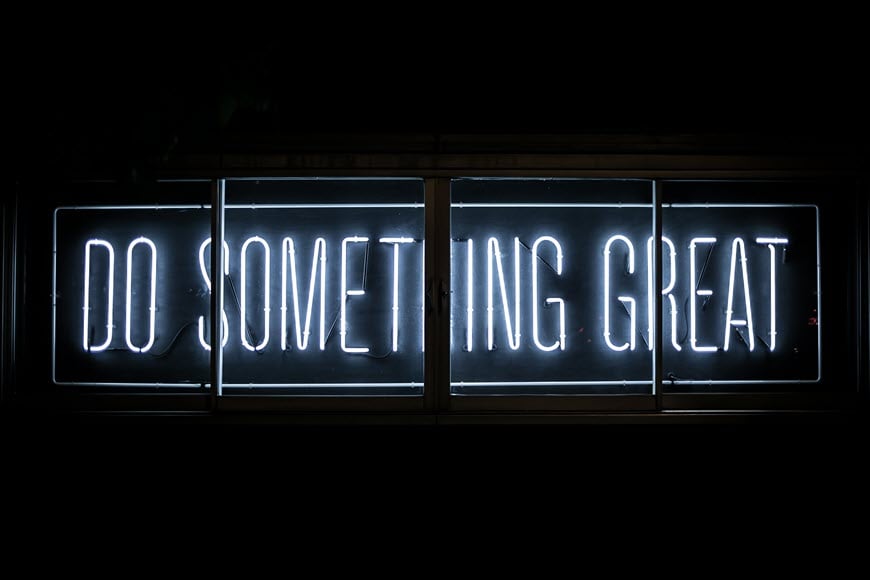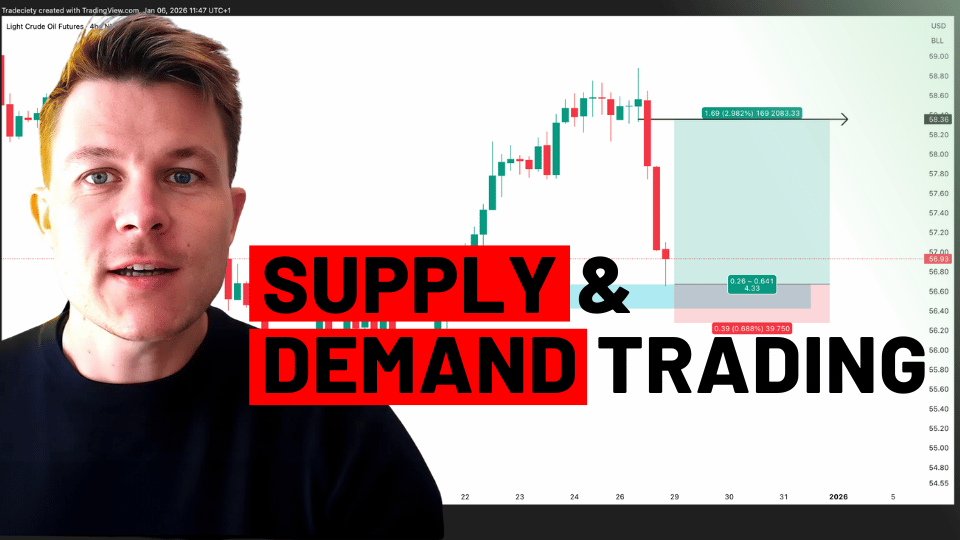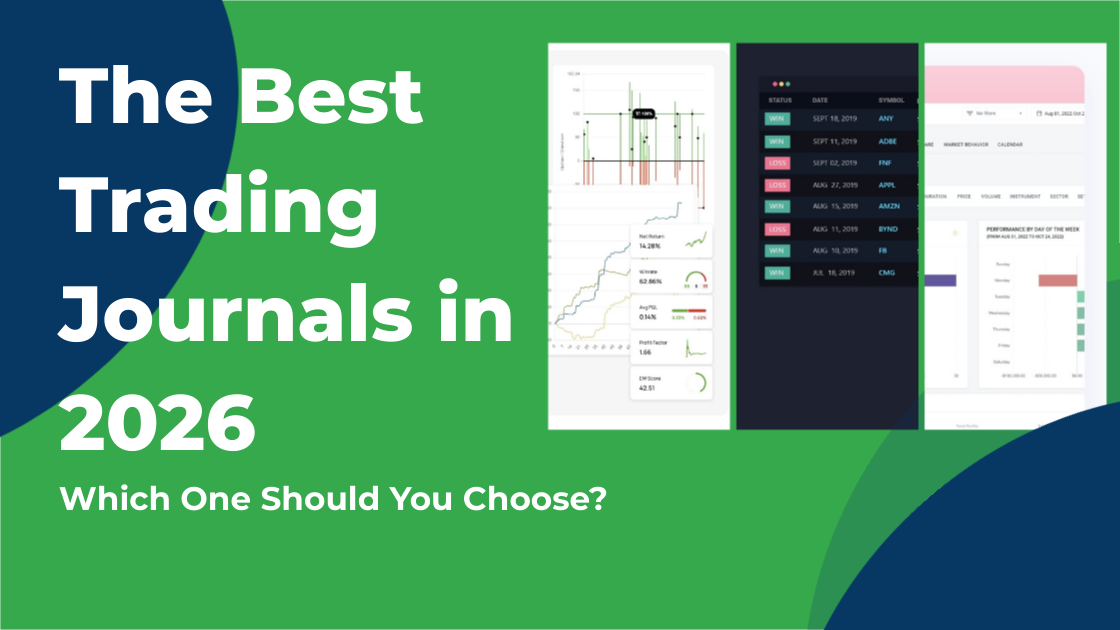Supply and Demand Trading in 2026
We have been trading supply and demand strategies for over ten years, and they have stood the test of time remarkably well. Supply and demand is...

Quotes can be helpful and inspiring, but there is so much more to those single-liners. When we read the one-sentence quotes, we must remember that they are taken out of context and that the quote’s author has said so much more.
This is why dissecting trading quotes can be hugely beneficial. It helps traders develop practical solutions and actionable trading tips by trying to get to the core of the message and go beyond a single sentence.
In the following, I collected some of the most well-known trading quotes. I want to share my thoughts about the underlying principles and how we can transform individual quotes into actionable trading tips.
"Don’t worry about what the markets are going to do; worry about what you will do in response to the markets." - Michael Carr
You have absolutely no control over what the price will do and where it will go.
Do not waste your time and energy on things that are outside of your control. Focus on where you can make a difference.
The job of a trader is to perform an objective price analysis and then act on the information. A trader must be ready for all eventualities that the price may express.
Before getting into a trade, here are some helpful questions to ask:
Asking such questions before you execute your trade can significantly improve your trading behavior.
“Markets can remain irrational longer than you can remain solvent.” – Keynes
When I look at this quote, I see traders who keep adding to a losing position as the market goes against them. Traders may see a clear chart pattern and obvious price action signals suggesting that a market will likely go in a certain direction. The clearer the signals, the more attached traders get to their trade idea.
But then the market goes the other way, and the trader cannot accept his failure because he is fully committed to his initial trade idea. He may also get his ego involved and wants to prove that he is right.
One of the most important trading principles is that anything can happen and that even the best trading setup can and will fail. Trading is a game of probabilities, and although the chart you are looking at shows the perfect setup, there is no reason it can´t fail.
As a trader, you have to be ready to accept when your trade idea is wrong to avoid catastrophic damages to your trading account.
"It's not whether you're right or wrong that's important, but how much money you make when you're right and how much you lose when you're wrong." — George Soros
Most traders struggle with optimizing their winning trades and often close out winning positions too early, potentially leaving money on the table. Especially new and struggling traders who lack confidence are prone to this behavior.
At the same time, when such traders are in a losing position, they will not close the trade for a loss, keeping it open, hoping that the price will turn around eventually. Delaying loss-taking is a cardinal sin in trading, and what usually happens is that an initially small loss turns into a much larger loss eventually.
Even traders with a high winrate may lose money if they frequently close winning trades too soon and let losses get out of hand. Therefore, traders have to closely monitor the ratio of losing and winning trades and work on optimizing their exit strategy.
“Where you want to be is always in control, never wishing, always trading, and always, first and foremost, protecting your butt.” – Paul Tudor Jones
When traders operate from the standpoint of “wishing,” they have usually deviated from their initial trading plan and broken their trading rules. They find themselves in trades that they should not be in. If you ever catch yourself uttering the words “I wish” in your trading, it is best to close the trade immediately.
You have to have a trading plan with well-defined trading rules. A good trading plan has rules for trade entries but, even more importantly, also for your exits. The exit strategy gives you an objective plan to minimize losses and optimize winning trades. Before you pull the trigger on your next trade, write down under which circumstances you will get out.
“Money is made by sitting, not trading.” – Jesse Livermore
Livermore refers to the importance of waiting for the right trading opportunity to arise before taking a trade and also not messing around with your trade position once you have placed it.
A big part of being a professional trader is patiently waiting for the right trade setups to present themselves. Amateur traders jump into the markets too soon, breaking their trading rules and giving in to their emotions.
Being selective with your trade execution is an important skill to develop as a trader. When you look back at your trade history, evaluate how often you have taken trades you shouldn’t have. It´s common to see that most trades should have been avoided.
Taking only the best setups and not doing anything in the meantime will usually make a huge difference for most traders.
“Letting losses run is the most serious mistake made by most investors.” – William O’Neil
This quote does not need any further explanation. It is the most important principle in trading.
Avoiding large losses is the number one priority for any aspiring trader. A trader who cannot take losses efficiently has no chance of ever becoming profitable. Even the highest winrate will not help you make money when you let your losses eat up all your past profits.
Therefore, if this is an issue for you, it has to be your top priority to work on this aspect of your trading first.
“Learn to take losses. The most important thing in making money is not letting your losses get out of hand.” – Marty Schwartz
Although this quote sounds similar to the previous one, learning to take losses goes much deeper and touches on other areas of your trading.
Traders who cannot take losses get emotional, engage in revenge trading, and often act impulsively. When you look at the historic winrate of the best traders, you will typically see a winrate of around 45% - 60%. It is exceptionally rare to see a professional trader with a higher winrate.
This also implies that around half of all your trades will turn out to be losses. Therefore, it is absolutely crucial that you learn how to take losses effectively because you will have to do this all the time.
Being good at taking losses means not getting emotional and staying objective. Wait for the next setup before trying to regain your loss. Do not increase your risk on the next trade to (potentially) make back your loss faster. Do not move your stop loss further away to delay loss-taking.
It is important that you are honest with yourself. Do you struggle with loss-taking? It may be time to develop better coping mechanisms. For example, if you get emotional after a loss, do not stay in front of your charts but get up and walk away. This way, you cannot cause any more damage to your trading account, and when you return the next day, things usually look much different. Over time, you will learn that not trying to make back losses right away is not a problem.
“In this business, if you’re good, you’re right six times out of ten. You’re never going to be right nine times out of ten.” -Peter Lynch
One of the best pieces of advice I can give new traders is to learn how to trade with a 50% winrate while paying close attention to their reward:risk ratio.
A trader who can trade comfortably with a 50% winrate with a 2:1 reward:risk ratio will undoubtedly make money long-term based on pure math.
This approach can be quite liberating because, in such a scenario, losses are not something to be avoided. Most traders could achieve a 50% winrate with a proper trading plan and thought-out trading rules.
Many traders’ problem is that they fight every loss and then get emotional. Such a trading approach is stressful and does not lead to good trading.
But amateur traders carry the (wrong) belief that a trading strategy is only good when you can have at least an 80% winrate. Chasing such numbers is totally unrealistic and will always lead to bad trading decisions. Settle for 50% and see how your whole trading will change.
“It’s not what we do occasionally that shapes our lives. It’s what we do consistently.” – Anthony Robbins
When I look at this quote, I first think about the power of implementing positive and supportive habits that fuel your growth.
But the genuinely motivating aspect of this quote comes from understanding that it is ok to give yourself room to mess up occasionally. You may have the goal of getting in shape and improving your health, and you have implemented good habits and are doing well – but then one day, you give in and eat that burger that you have been craving for so long, or you empty the bag of chips while binging on your favorite series. I would have considered myself a failure a few years ago and probably completely abandoned my big goal while engaging in a lot of negative self-talk. One single slip-up would have led to the next, then to the next, and then to me ultimately forgetting about my big goals.
Nowadays, I tell myself that this is OK and there is nothing wrong with “breaking the rules” occasionally as long as I get back on track the next day. I won’t let a single failure take me off the path and away from the overall master goal.
I have seen that many traders are also way too hard on themselves. You may be able to trade really well for a couple of weeks, but then one day, you act on your FOMO and break your rules, and you get upset with yourself. You beat yourself up mentally, and it completely wrecks your trading. Be OK with messing up. It is normal, and it is human. It would be unrealistic to expect that you can avoid any mistake, failure, or setback.
Don’t let one single failure destroy all your past progress and keep you from realizing future progress
“If you can learn to create a state of mind unaffected by the market’s behavior, the struggle will cease to exist.” – Mark Douglas
The market and the candlesticks are not your enemies. You cannot will the price to move to your take profit target, and you must stop fighting the price. Trading is not a war!
Such an approach is stressful and energy-draining because no matter how hard you try, this part of trading is entirely out of your hands.
As a trader, we have to be sure about the rules of our trading strategy and then execute relentlessly. And once the trade is on, the result is out of your hands. Of course, you can react to changes in price behavior and manage your trade – but only insofar as your trading strategy tells you to. Avoid impulsive and emotional trading decisions, as they quickly consume your mental capital.
If you get emotional, get up and take a short trading break. When you return, you have gained a new perspective, and things usually look much different.
Go with the flow!
“I believe in analysis and not forecasting.” – Nicolas Darvas
Analyzing refers to looking at the objective signals that a market is providing. Traders can use price action concepts, utilize trend analysis, look for chart patterns and specific indicator signals, consult fundamental data, and more.
The goal is to identify repeatable and objective signals that they can continually trade to develop their edge.
Forecasting refers to pure guessing, often done without proper analysis and a thoroughly thought-through trading strategy. Also, traders who forecast often have a strong bias and are completely locked into their trade idea. In trading, we then say that such traders are “married to their trades,” and they don´t see signals that would contradict their trade idea.
Traders always deal with incomplete information, and the future cannot be known. Therefore, forecasting is clearly the wrong approach and can be harmful. A proper, objective analysis is what serious traders should go for.
"Limit your size in any position so that fear does not become the prevailing instinct guiding your judgment." – Joe Vidich
If you act impulsively during your trades or experience much fear, your position size could be an issue. Traders who risk too much on any given trade are more likely to experience intense emotions and then make bad trading decisions.
General trading advice suggests starting around the 1% risk level. This means you risk 1% of your total trading capital on a single trade. If you have 10.000 USD in your trading account, 1% equals 100 USD. However, those numbers are just rough guidelines.
If you still get quite emotional, reduce your position size further until it feels comfortable. Finding the optimal position size is a process; every trader will handle it differently.
"The hard work in trading comes in the preparation. The actual process of trading, however, should be effortless." – Jack Schwager
When Jack Schwager refers to preparation, it means trading plans, working on one’s strategy, backtesting, and evaluating their performance to find one’s edge. Because once you sit in front of your charts, you execute the rules you have so carefully worked out beforehand.
In professional sports, all the work is done before the team, or the athlete steps out on the field. All the training has prepared him for the match. During the match, it is “just” about executing.
The typical process can look like the following:
"Do more of what works and less of what doesn’t." - Steve Clark
This quote implies that you must know what works and what does not. And this is done through record-keeping and working with your trading journal.
Most struggling traders do not have a trading journal which is a huge mistake because traders need a review process to stop repeating the same mistakes.
Ask yourself right now: do you remember your last 20 trades? If the answer is no – which it will inevitably be – how can you expect to improve over time and find out what works and what doesn’t?
Having a trading journal is not only a must but will also shorten your learning curve.
“Trading doesn't just reveal your character, it also builds it if you stay in the game long enough.” ― Yvan Byeajee
Every trader’s journey comes to a point when he realizes he is the weakest link in his trading business. The need for self-improvement arises from this realization.
This can be a beautiful insight because it allows your trading to become a vehicle to transform yourself in other areas and spill over into your daily life.
The meta-skills that a trader needs to develop are:
And, of course, those qualities will undoubtedly improve your daily life and your interaction with the people around you.
Dissecting trading quotes and trying to get to the core of the message can be a great practice. It really forces you to think through what those great traders meant. We forget that the single one-liner quotes that we see on social media or elsewhere are taken out of context. There is so much more behind those quotes.

We have been trading supply and demand strategies for over ten years, and they have stood the test of time remarkably well. Supply and demand is...

3 min read
Choosing the right trading journal is essential for traders wanting to analyze performance, refine strategies, and improve consistency. In this...

3 min read
“95% of all traders fail” is the most commonly used trading related statistic around the internet. But no research paper exists that proves this...